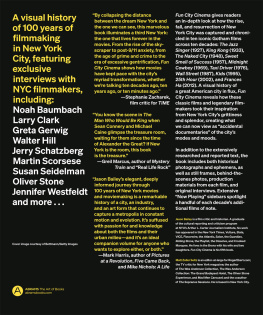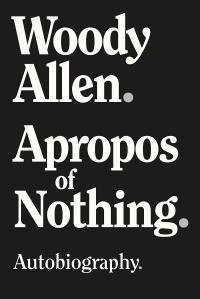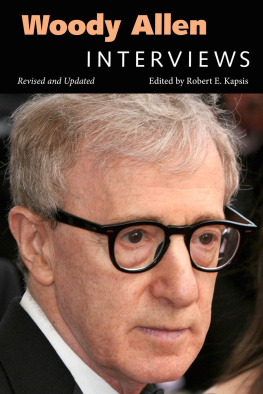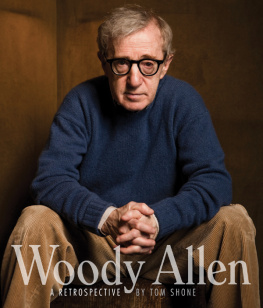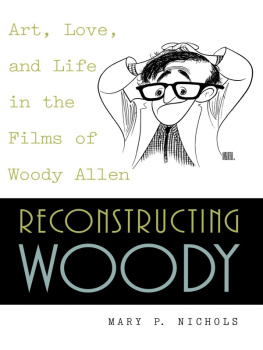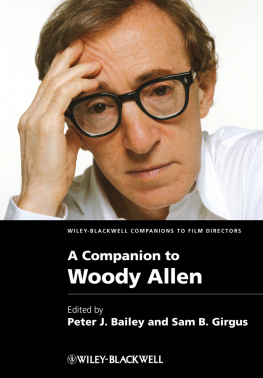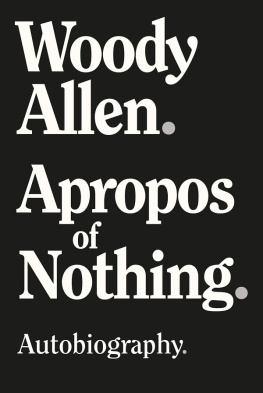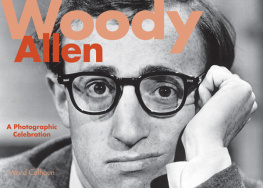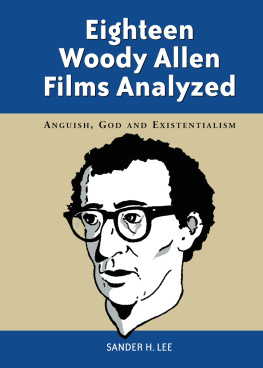You ask how I have lastedparticularly given all my flaws, my limitations both artistically and as a person, my phobia, my idiosyncrasies, and my artistic pretensions and absolute creative demands in a venal cutthroat industryoperating with only a minor gift?
Heres the answer: As a kid I loved magic and might have become a magician if I hadnt been sidetracked. And so, using all my sleight-of-hand skill, my misdirection, my subtle subterfuges and showmanshipthat is, everything Ive learned from poring over my magic books as a kidIve been able to pull off a brilliant illusion that has lasted now over fifty years and includes scores of movies. Houdini, Blackstone, Thurston, all the prestidigitators of my youth would have been proud.
I wish I was kidding.
Woody Allen, 2000
THE ULTIMATE
Woody Allen
FILM COMPANION
Jason Bailey

For Lucille,
Who Tops My Manhattan List
First published in 2014 by Voyageur Press, an imprint of Quarto Publishing Group USA Inc.,
400 First Avenue North, Suite 400, Minneapolis, MN 55401 USA
2014 Quarto Publishing Group USA Inc.
Text Jason Bailey
All rights reserved. With the exception of quoting brief passages for the purposes of review, no part of this publication may be reproduced without prior written permission from the Publisher. The information in this book is true and complete to the best of our knowledge. All recommendations are made without any guarantee on the part of the author or Publisher, who also disclaims any liability incurred in connection with the use of this data or specific details. This publication has not been prepared, approved, or licensed by Woody Allen or any studio or production company. We recognize, further, that some words, model names, and designations mentioned herein are the property of the trademark holder. We use them for identification purposes only. This is not an official publication.
Voyageur Press titles are also available at discounts in bulk quantity for industrial or sales-promotional use. For details write to Special Sales Manager at Quarto Publishing Group USA Inc., 400 First Avenue North, Suite 400, Minneapolis, MN 55401 USA.
To find out more about our books, visit us online at www.voyageurpress.com.
Digital edition: 978-1-62788-545-4
Hardcover edition: 978-0-76034-623-5
Library of Congress Cataloging-in-Publication Data
Bailey, Jason, 1975
The ultimate Woody Allen film companion / Jason Bailey.
pages cm
Includes bibliographical references.
ISBN 978-0-7603-4623-5 (hardback)
1. Allen, Woody--Criticism and interpretation. 2. Allen, Woody--Film catalogs. I. Title.
PN1998.3.A45B33 2014
791.43092--dc23
2014011492
Editor: Josh Leventhal
Design Managers: James Kegley, Brad Springer
Cover designed by Brad Norr Design
Designer: Brad Norr Design
Contents
Prologue
W oody Allens mother took him to buy the Olympia typewriter when he was sixteen years old. It cost $40, a hefty sum for a comedy writer just starting out in the business, but it was a smart buy. Its heavy and solid, he recalled decades later, not like these plastic typewriters they have today. I remember when my mother took me to buy it, the salesman told me, This typewriter will last longer than you will. It looks like he might have been right.
Every year, Woody sits down at that Olympia typewriter and writes whatever movie hes in the mood to do next. Sometimes its a comedy and sometimes its a drama; hes written musicals and mysteries and farces and chamber pieces. When hes done writing the script, he goes off and makes the film. He is involved in every step of the process: casting (often using the hottest and most talented actors, who will gladly take considerable pay cuts for the street cred of making an Allen film), scouting, shooting, and editing. Once he has approved the final cut, he goes to work on his next script, usually without a single day off. That script will occupy him for the next year. He does not write to please critics, whom he does not read, or win awards, which he does not accept. He does not bend to the will of the box office, where his record is spotty at best, nor of studio executives, from whom he has complete independence. He just goes off and makes a film, and then he makes another. Hes been doing it this way for nearly half a century.
Who the hell is good for twenty years? asks Chris Rock, not unreasonably. This guy is good for forty years. Hes kind of peerless. And he is. New York Times critic Vincent Canby, one of Allens first champions, called him Americas most authentic, most serious, most consistent film auteur, and thats as good a description as any. Allen, of course, would disagree. He holds himself to the highest standards, to that of his heroes Bergman and Bunuel and Kurosawa and Welles, and by that barometer, he says, I havent even come close. I think Ive made some decent movies and a large number of okay movies, but Ive never made a great movie.
Woody Allen on location at Coney Island during shooting for one of his best-loved films, Annie Hall. Brian Hamill/Getty Images
This book begs to differ. Woody Allen has made many great movies, perhaps more than any filmmaker of his time. Granted, some have also been merely decent or just okay (and a couple less than that), but all are worth considering within his body of work, which is unparalleled in modern American film. The director will allow at least that: I would think even the ones that were not popular when they came out will have supportive interest to the more popular ones, because I think at the minimum, there are things in all of these pictures that are worth seeing.
This volume will consider all of his movieswell, as close to all of them as possible, since in the window between the completion of its writing and its arrival on shelves, a new Allen film will appear. In between the film-by-film exploration of his body of work, well examine Woodys working methods, look at the evolution of his distinctive style, dig deep into issues of persona and autobiography, and explore the common threads in his filmographywhat Allen calls certain issues and questions that repeat themselves in the movies over and over again. Charles Champlin wrote of Allen by recalling Jean Renoir, who once said he had made not twenty-eight films but one film in twenty-eight versions or chapters. The comparison is apt. Allens filmography lends itself to this kind of bulk consideration because he has spent so much of his life and art returning to the subjects that interest him, but from surprising new angles and in vastly contrasting tones, building out from previous observation.

For a discussion of Magic in the Moonlight and other future Woody Allen projects, visit www.jason-bailey.com/p/woody-allen-book.html for updates and new essays.
What this volume will not do is tackle, at any great length, the scandals and accusations that have circled Mr. Allen for the past two decades and sprang back into the headlines shortly before going to press on this book. This is in no way meant to dismiss the importance of these allegations, but simply to acknowledge that our focus here is on the work and not the lifeat least as much as the two can be separated.


